Navigating Traffic in Ha Giang Loop: Tips for Safe Travel
Ha Giang Loop in northern Vietnam is well-known for its tough terrain, meandering roads, and amazing scenery. Still, one of the most crucial factors to weigh before getting on the road is traffic navigating. It’s about adjusting to the special driving challenges this region offers, not only about going from point A to point B. Let MOTOGO Tours start navigating traffic in Ha Giang Loop
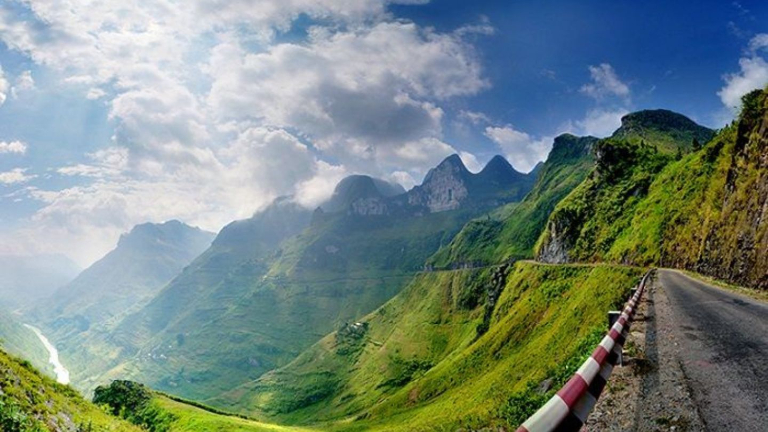
Why Ha Giang Loop is a Must-Visit
The Ha Giang Loop is an experience as much as a location. One of Vietnam’s most popular motorcycling paths, the loop winds via majestic mountains, verdant valleys, isolated communities, and picturesque viewpoints. Here, the traffic is unlike anything you will see in the busy streets of Hanoi or Ho Chi Minh City. Though beautiful, the local roads can be narrow, hilly, and rocky, requiring more than just the typical driving ability.
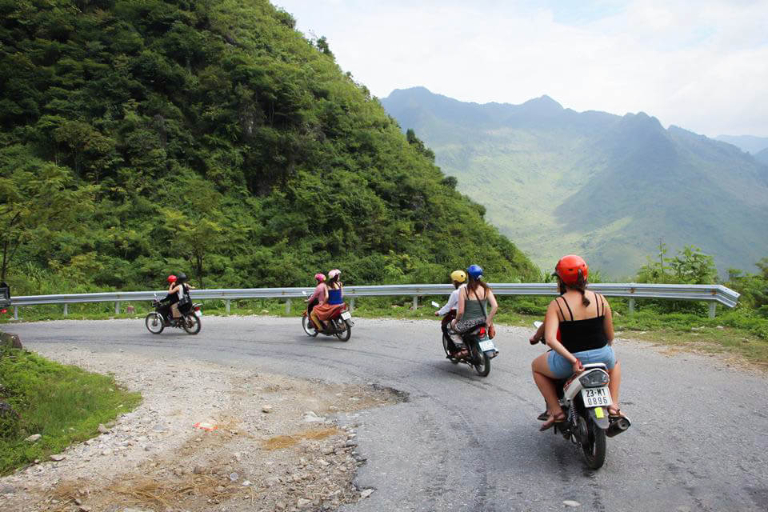
Traffic navigation in Ha Giang Loop has special difficulties. Whether your trip is first-time or experienced, knowing these difficulties will help you to have a safe and fun ride. From narrow mountain roads to local driving habits to steep climbs and erratic weather, the Ha Giang Loop calls for particular care. Here is what you need know to maximize your trip.
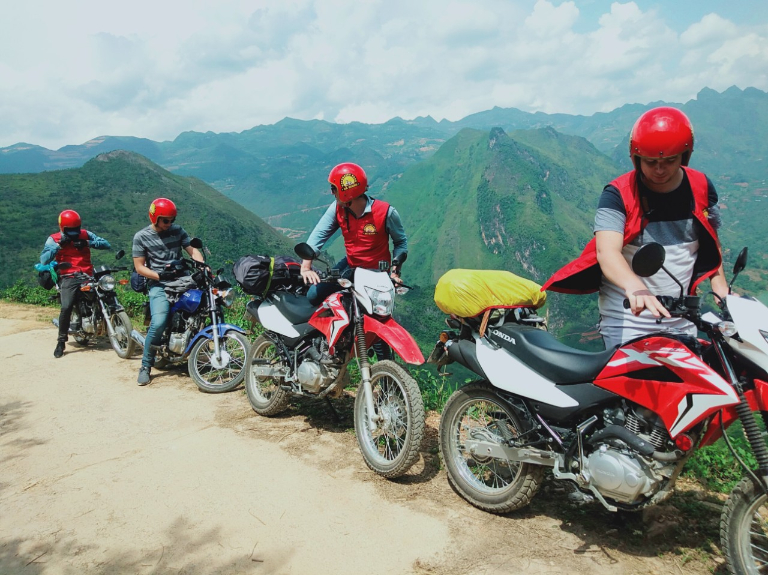
>>> Explore Mistakes to Avoid on the Ha Giang Loop – A Guide for Safe and Enjoyable Rides
Understanding the Terrain of Ha Giang Loop
You must first know the terrain you will be working with before delving into particular traffic advice. Over 300 kilometers of the northernmost part of Vietnam make up the Ha Giang Loop. From gravel trails and dirt roads to well-kept walkways, the roadways are quite varied. Knowing what to expect will enable you to be ready and modify as necessary.
Winding Roads and Steep Hills
Renowned for its meandering paths, the Ha Giang Loop winds over mountains, cliffs, and steep hillides. These roads have some major driving difficulties even while they provide panoramic views of the limestone karsts and rivers below. Often abrupt, the curves have close switchbacks requiring careful and patient movement. Particularly while approaching blind bends that can hide incoming vehicles or obstructions, riders must be ready for unexpected direction changes.
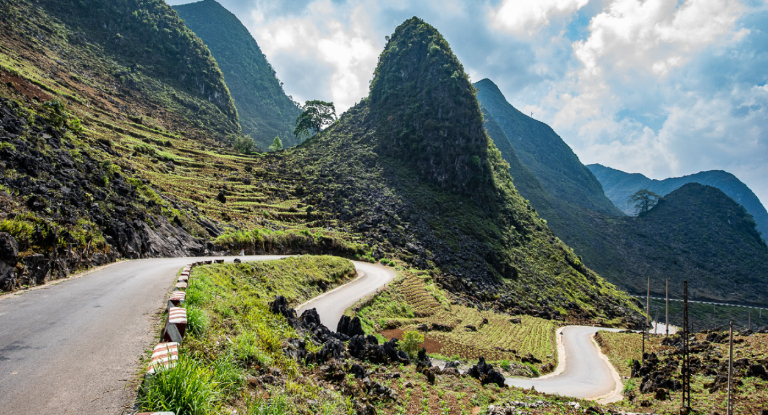
Along the loop, the high hills and falls also necessitate that the engine and brakes of your motorbike must be in perfect condition. Riders often come into extended lengths of uphill or downhill riding. While downhill sections call for regular brake control to prevent acquiring too much speed on the descent, hill climbing can tax the engine. If you have never negotiated such terrain, practice ahead to become comfortable controlling your balance and pace.
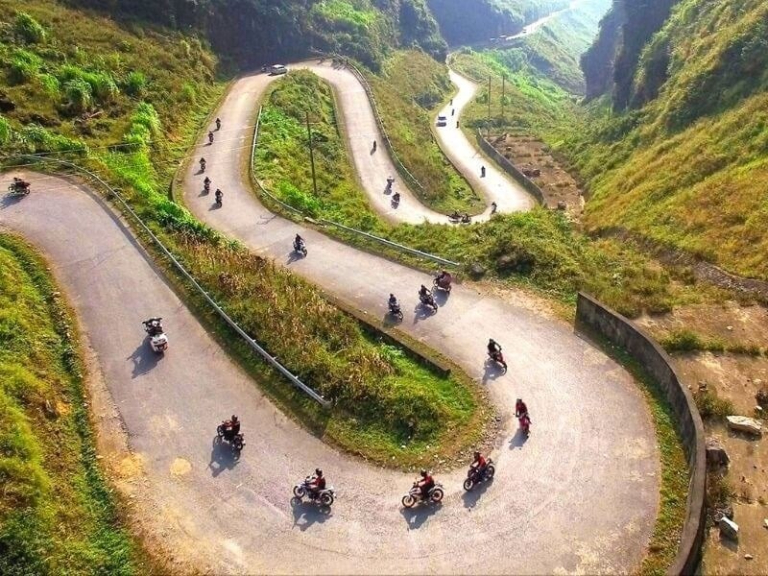
Villages and Remote Areas
Traveling through many villages and small towns along the Ha Giang Loop is a trip into rural Vietnam. Though the landscape is amazing, keep in mind that the roads throughout these regions may be limited and less dependable. Local pedestrians, kids playing close to the road, and even cows, buffaloes, and poultry crossing the roadway will often come across you. Unlike in cities, traffic signals or signs are sparse, hence drivers are expected to act politely and carefully.
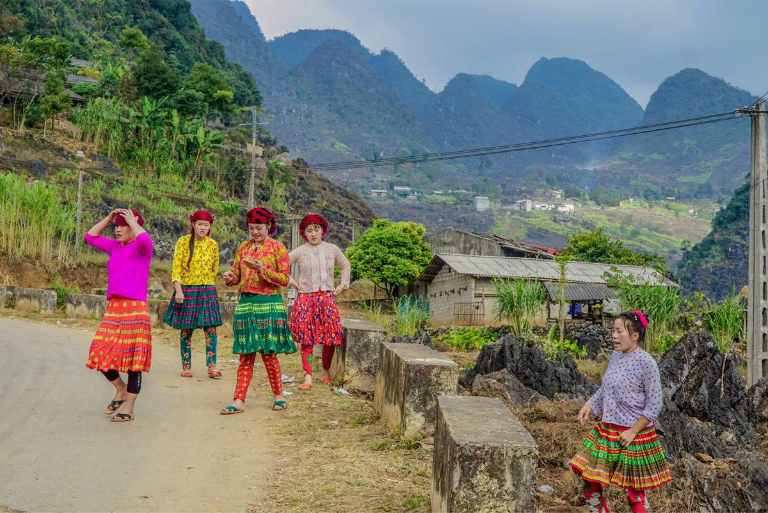
Usually located around the main road, these communities feature market booths, stores, and homes along the road. Slow down and be ready to stop unexpectedly as you pass them. Local cars might turn abruptly without warning, or a peasant might walk onto the road without warning. Passing through these locations needs both patience and attention. Apart from that, it’s a fantastic chance to experience close-up traditional Vietnamese life and absorb the local culture.
Common Traffic Issues on Ha Giang Loop
With its amazing scenery matched with difficult traffic, the Ha Giang Loop is an exciting and demanding ride. Whether you ride this route regularly or are a first-time visitor, knowing the typical traffic problems on this path can assist you to remain safe and really enjoy the ride.
Narrow and Unpredictable Roads
The Ha Giang Loop’s narrow, winding roads—which are typical of this mountainous area—present one of the most obvious difficulties. Particularly along steep hills and fast twists, the roads frequently lack guardrails, hence careful navigation is quite important. Many roads are just wide enough for one car, hence you will have to use caution and patience when facing approaching traffic. Common behavior here is pulling over somewhat to let another biker or car pass.
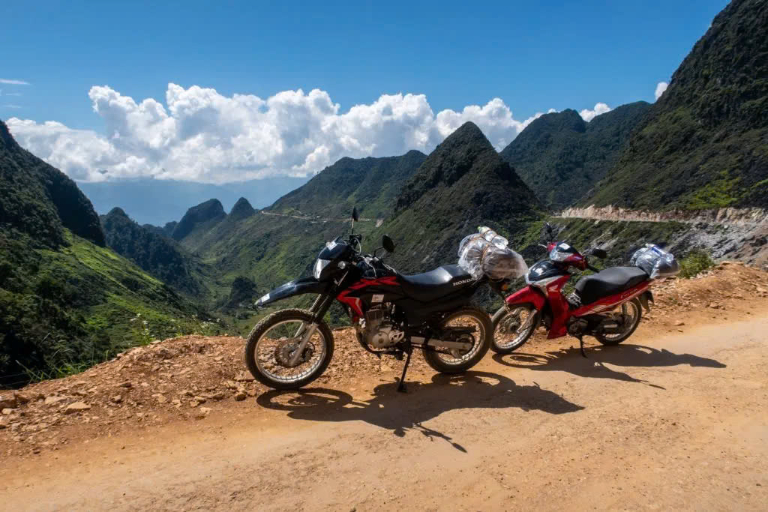
To navigate these roads safely:
- When approaching bends or small areas, slow down since view may be restricted.
- Particularly on stretches with sharp declines, keep close to the inside edge of the road.
- If at all possible, especially in confined areas, yield to bigger cars.
Motorbike Traffic and Other Vehicles
Ha Giang Loop is dominated by motorbikes, which both locals and visitors alike choose for ease. But the concentration of motorbikes, particularly in busy travel times, can cause traffic on smaller portions of the road to be congested. You might also come across trucks, buses, and even agricultural equipment needing a far bigger section of the road.
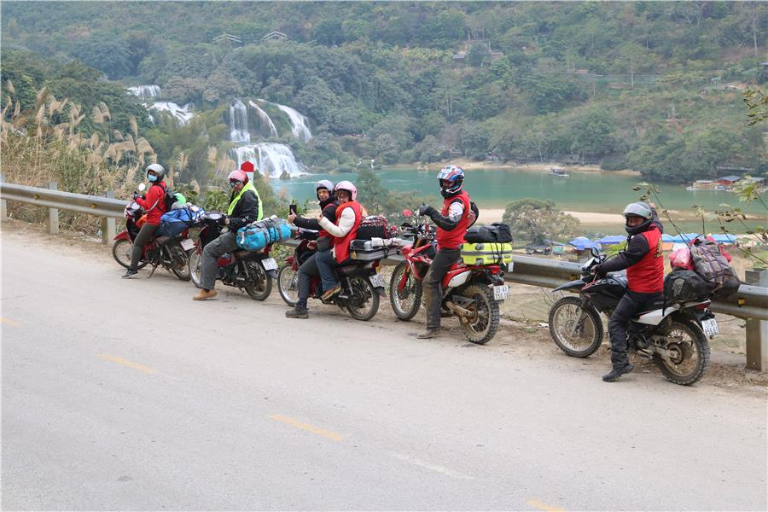
Tips for handling mixed traffic:
- Give enough room between you and other motorcycles to prevent inadvertent runs-on.
- Only overtake on straight, unobstructed stretches to be sure no oncoming cars are in route.
- Remain alert close to cities and villages; children, animals, and pedestrians could also be sharing the road.
Road Conditions: Potholes and Construction Zones
The season and the particular section of the Ha Giang Loop greatly affect the state of the road conditions. Although some areas have really good paving, others show potholes, uneven places, and sporadic landslides. Although road maintenance is continuous, construction can be delayed owing to the remote location and you might come across active work zones including large machinery. After rain, these road conditions can be particularly dangerous since mud and gravel might make surfaces slipper.
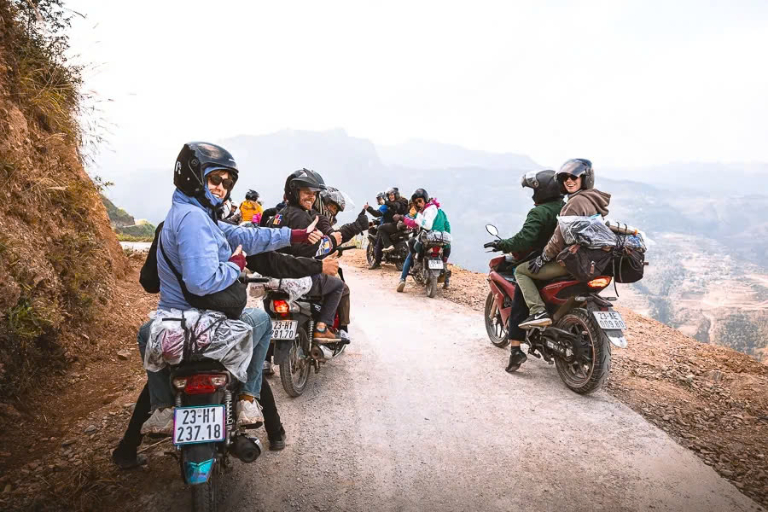
How to handle poor road conditions:
- On uneven or rough areas, keep your speed low to preserve control.
- Look for road signs or barriers marking work areas; slow down far in ahead.
- Avoid big potholes; they could ruin tires or possibly throw off balance.
>>> Explore Motorbike Maintenance Tips for Long Ha Giang Loop Trips
Weather-Related Traffic Issues
During the rainy season—May to September—the Ha Giang Loop has erratic weather including fog, unexpected rain showers, and sometimes landslides. Particularly on dirt or gravel portions, heavy rain can cause soggy roads, poor visibility, and slick situations. Higher altitudes are more likely to produce fog, which can seriously limit visibility and complicate traffic expectation around turns.
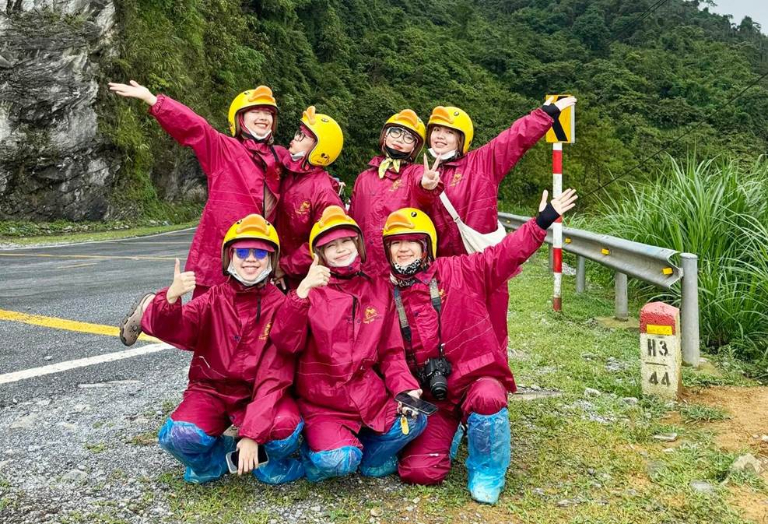
Weather-specific driving tips:
- Check the forecast to steer clear of being caught in fog or intense rain.
- In low-light, use fog lights or headlights to increase view.
- In rain or fog, slow down since road traction loses and stopping takes more time.
Unexpected Obstacles: Livestock and Pedestrians
Animals including cows, goats, and chickens regularly wander freely on the Ha Giang Loop as it goes through several rural towns and agricultural areas. You also probably will run across pedestrians, including residents heading to market or youngsters walking to school. For fast-moving motorcycles, animals can be erratic and occasionally darting across the road without warning can be hazardous.
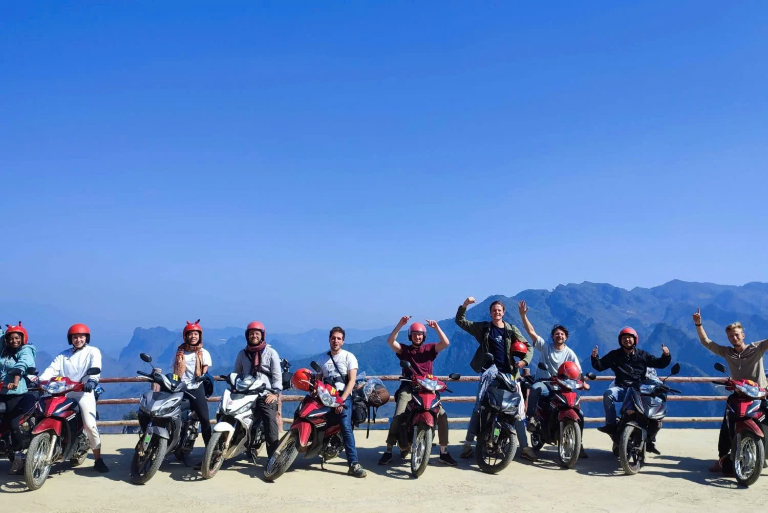
Tips for handling unexpected obstacles:
- Slow down when traveling through towns and keep close eye on pedestrians or animals.
- If animals or humans are obstructing the road, use your horn sparingly to notify them; but, try not to startle them.
- Give cattle lots of room since they could not go in straight lines.
Limited Signage and Navigation Aids
Signs in more isolated areas of the Ha Giang Loop may be few or written in Vietnamese, which would be challenging for visitors not familiar with the area. Especially in places with limited landmarks, navigating without clear directions might cause missed turns or increased stress. While GPS is useful, in some mountainous places signal reception can be poor.
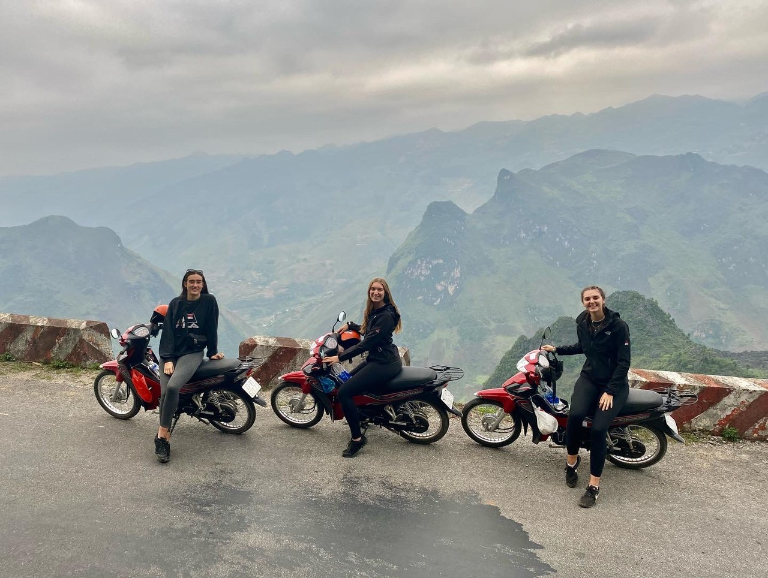
Tips for navigating with limited signage:
- Download offline maps on your phone; should you lose cell service, these could literally save your life.
- Before starting the journey, mark important sites and towns to help you to have a broad sense of your advancement.
- If you’re not sure, ask residents for instructions; most Ha Giang people are polite and ready to assist.
>>> Explore Ways to Explore the Ha Giang Loop: A Guide to Your Adventure in Northern Vietnam
Tips for Safe Driving in Ha Giang
Driving safely in Ha Giang needs both awareness and some planning given the difficulties. These professional pointers should help you keep things in perspective.
Proper Motobike Preparation
Make sure your motorcycle is in perfect shape before you start riding. This covers looking at the tires, brakes, lights, and gasoline. Breaking down one of the more isolated parts of the loop last thing you want.
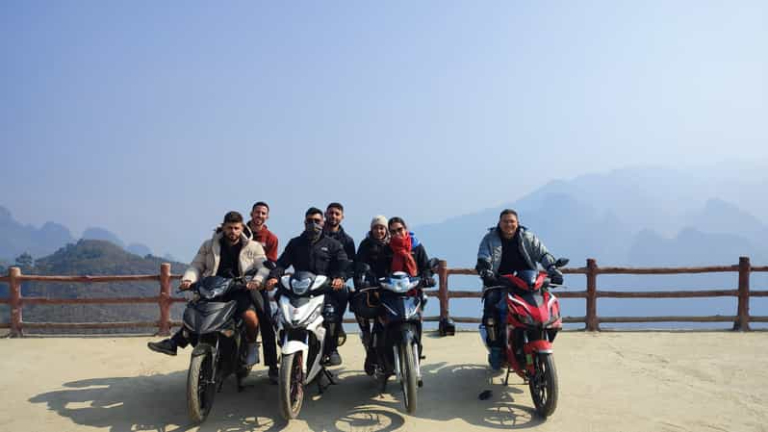
Driving Techniques for the Ha Giang Terrain
Maintaining a consistent speed and keeping both hands on the handlebars is crucial when negotiating the hillside, twisting roads. Take your time and savor the trip; do not hurry. Stay a safe distance apart from other cars and get ready for abrupt stops.
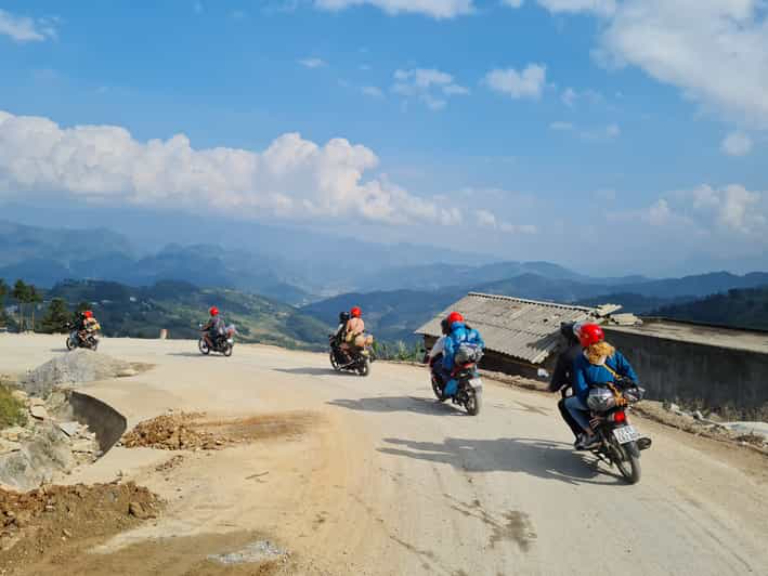
How to Handle Difficult Road Conditions
On the Ha Giang Loop, potholes, mudslides, and uneven surfaces are rather frequent. In these circumstances, slow down, keep under control, and be especially careful negotiating challenges. Always modify your driving if it is raining since the roads could get slick.
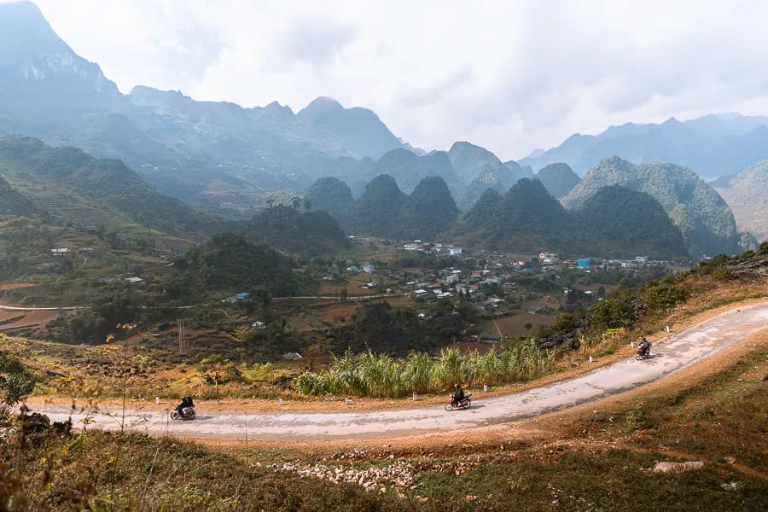
Navigating traffic in the Ha Giang Loop is an adventure that requires patience, preparation, and caution. The breathtaking landscape is worth the work; following the advice in this article will help you to be ready to face the traffic problems. Take your time to savor the amazing scenery, fully experience the local way of life, and welcome the excitement of the open road; do not hurry the trip.
Related Posts:













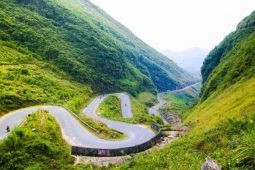
Be the first to comment!